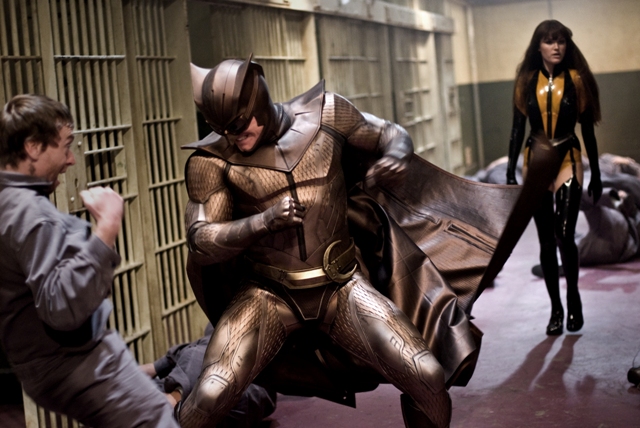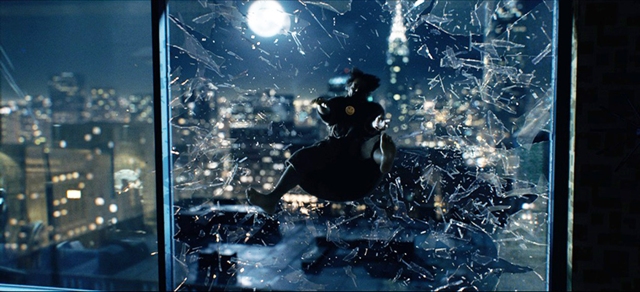CHICAGO – In anticipation of the scariest week of the year, HollywoodChicago.com launches its 2024 Movie Gifts series, which will suggest DVDs and collections for holiday giving.
Zack Snyder Turns ‘Watchmen’ Into Loud, Disjointed, Brutal Mess
 Rating: 2.0/5.0 |
CHICAGO – For years, fans of Alan Moore and Dave Gibbon’s masterful and influential “Watchmen” have been waiting for a filmmaker willing to faithfully and slavishly adapt their favorite graphic novel. Well, we got what we wanted in Zack Snyder’s frame-copying vision of this legendary book, but as someone once said - You should be careful what you ask for because you just might get it.
Snyder’s take on “Watchmen” is like a karaoke singer who hits most of the notes but doesn’t understand the lyrics to the song. The filmmaker has recreated a majority of the panels from his source material, but he’s compiled them in such a way that makes for a brutal, disjointed, misguided experience.
There are enough good ideas in the original that people unfamiliar with it and still refusing to read it may have something to talk about after seeing “Watchmen” but those elements that work are in spite of the people who made this film, not because of them. Except for a few strong performances (balanced out by a few awful ones) and the strength of the ideas at the core of “Watchmen,” the film is a complete disaster, one of the biggest disappointments of the last several years.

Patrick Wilson as Nite Owl II, Malin Akerman as Silk Spectre II and Jackie Earle Haley as Rorschach.
Photo credit: Warner Bros. Pictures
The opening credits to “Watchmen” arguably make up the most effective sequence in the film. Set to “The Times They Are A-Changin’,” Snyder introduces us to his alternate universe, one in which masked crusaders have come and gone and Richard Nixon is still President in 1985. The world is on the edge of nuclear armageddon as the U.S. and U.S.S.R. have their nuclear weapons pointed at each other, held back from launching them by the existence of a God-like figure named Dr. Manhattan (Billy Crudup).
During these tumultuous times, a former hero, The Comedian (Jeffrey Dean Morgan) gets tossed from his skyscraper window. Someone is killing off former heroes. And all the people who were near Dr. Manhattan during his time on Earth appear to be dying of cancer.
The misanthrophic Rorschach (Jackie Earle Haley) suspects that The Comedian was not killed by a burglar and that someone may be targeting former heroes. He goes to warn the people otherwise known as Nite Owl II (Patrick Wilson), Silk Spectre II (Malin Akerman), and Ozymandias (Matthew Goode).
The story for “Watchmen” goes deep into what it means to be a hero and a villain, especially in a world where the two are often interchangeable. When good guys develop weapons that can bring about the end of the world and when our greatest fear is the use of those weapons, what can a masked hero possibly accomplish? And when people on the side of good look deep into the heart of evil, is it unreasonable to think that some of it won’t rub off on them? “Watchmen” is not only about the fate of mankind but whether or not there is really anything that can be done to save it.

Nite Owl II (Patrick Wilson) fights off a rioting prisoner as Silk Spectre II (Malin Akerman) lends a hand.
Photo credit: Warner Bros. Pictures
It’s deep material for a graphic novel and even deeper material for a 162-minute pop epic. Apparently, too deep.
The big problem with “Watchmen” is that Snyder and writers David Hayter and Alex Tse have to rush through the multi-chapter book, creating a disjointed film in which none of the action is given any time to sink in. “Watchmen” was originally published in single book episodes for a reason. You’re not supposed to read it all at once. You’re supposed to let parts of it sink in before moving on to the next.
Part of the failure of “Watchmen” comes down to one of the essential differences between the forms - chapters. Moore and Gibbons clearly wanted readers to step back and digest what had just happened, even going as far as to end each book with a non-illustrated chapter of a fictional work from the “Watchmen” universe.
With the breaks of the original removed, “Watchmen” feels completely different. It’s rushed, like a season of a TV series crammed into a nearly three-hour running time. If someone took all the highlights of a season of “Lost” and put them on the big screen for a 160 minutes, it wouldn’t be the same experience. It wouldn’t work. Nothing is given time to breathe in Snyder’s “Watchmen,” as each revelation, each origin story, each character introduction is hurried through to get to the next.
Stories like “Watchmen” are not the sum of their parts. They need a filmmaker who can recognize the difference between the forms and turn a great novel into a great film. By being so loyal to the source, Snyder has made a film with bizarre pacing problems, sudden transitions, and some scenes that simply don’t work on the screen like they do on the page.

Jeffrey Dean Morgan as The Comedian.
Photo credit: Warner Bros. Pictures
The biggest problem Snyder has is with tone. There are brutally violent passages in “Watchmen” and a genuine quality to Jackie Earle Haley’s movie-stealing performance as Rorschach that feel like they’re from a different movie than Matthew Goode and Malin Akerman’s Saturday morning cartoon characters. On the good side, Crudup adds a touching sadness to his vocal work as Dr. Manhattan that does truly work and his biggest passage - the origin story of Dr. Manhattan - is easily the best part of the film.
RELATED READING 26-Image Slideshow from Watchmen, Part One 26-Image Slideshow from Watchmen, Part One
|
So, ultimately, “Watchmen” the movie is faithful to “Watchmen” the book. But to what end? It would be a four-hour film if Snyder and his writers included every element of the book, so once that was deemed impossible, why stay so loyal? If I told you that you could only sing two out of three notes of a song, would you think your cover version would be the same?
There are elements of film - storytelling, pacing, tone - that are different than the graphic novel and it’s almost as if those elements were never considered because everyone was so concerned with being loyal to the book. “Watchmen” is widely regarded as one of the most important and influential graphic novels ever written but none of that registers in the film version.
And that’s what’s truly tragic about “Watchmen”. It will be a footnote. Yes, it will make a killing opening weekend at the box office, but this is a movie that will be forgotten by the summer, much less the end of the year. It’s a tragic ending to the story of one of the most anticipated adaptations in years and a joke that even The Comedian wouldn’t find funny.
 | By BRIAN TALLERICO |



Watchmen Fans Are A**holes
I hated the comic and I really hated the movie. And Alan Moore is a pompous ass-wipe who has no respect for the comic book mythos. The only people who liked the movie were the ones who liked the novel and were going to fall in love with any film version of Moore’s trite “vision”. A movie has to stand on its own, and this one was poorly directed, poorly acted, poorly edited and really juvenile and ameteurish behind it’s alleged deep facade. This was “The League of Extraordinary Gentlemen” in tights.
Completely agree
For starters I wanna say I love the trolls. The guys who instantly insult someone’s home/personal traits just because they disagree about a movie. You guys are awesome because you set geeks like me back 1000 years. With the advent of the internet I suddenly understood why we nerds are so persecuted.
Moving on, I completely agree that Watchmen wasn’t that good of a movie. It held my interest until the second trip to mars. In the novel this was an amazing, emotional moment. Unfortunately, in the movie… it feels… forced in. I don’t know, maybe it’s Malin Ackerman’s acting style. Maybe it’s the pacing. Maybe it’s the forced addition of Jon being able to share his powers, to explain flashbacks. (like the audience needs an explaination of this?) From that point on, the film takes a drastic and awful turn. From the way they forced in the revelation of the comedian’s true identity, to Ozzy’s speeches, to the unexplained appearance of Bubastsis, despite the lack of need for genetic engineering with the new ending, all the way, finally, to the forced way Dr. Manhattan regains his humanity and becomes a “true hero” sacrificing his reputation at the end of the film, my eyes rolled more than there were frames per second on the screen.
I’ll agree that the first part of the movie was beautiful and a well done adaptation, but I think that last half proved what Mr. Moore has been saying. Stop trying to make films out of his writing.